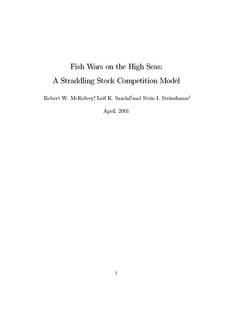Fish wars on the high seas : a straddling stock competition model
Working paper
Permanent lenke
http://hdl.handle.net/11250/164055Utgivelsesdato
2001-04Metadata
Vis full innførselSamlinger
- Discussion papers (FOR) [566]
Sammendrag
The post World War II era saw the development of powerful self-contained fishing fleets, so-called distant-water fleets (DWFs), which roamed the
worlds oceans, seeking out rich harvesting targets wherever they might be found. These fleets practiced pulse fishing, harvesting a given fish stock
intensively, then moving on, leaving a depleted fishery which might require many years to recover.
With the creation in the 1980s of coastal states' extended economic zones ((EEZs), to manage fisheries out to 200 miles from the shore, it was hoped that the DWFs would close down. But the ranges of many important commercial fish stock straddle the boundaries of several EEZs, and continue out into international waters. Thus the consequence of creating the EEZs has been to encourage development of coastal countries' national fleets, while the DWFs continue to harvest in international waters. Since these separately managed fleets are harvesting from a common pool resource, this situation sets up a destructive confrontation, a classic "fish war".
Here we model the fish war between a DWF and a regionally-based coalition of coastal states, operating out of their EEZs. The outcome is again a pulse fishery, but one which may be even more destructive than was the former situation, when the DWF was unopposed.
Finally we point out the relevance of the fish war model to the issue of creating effective multinational Regional Fisheries Management Organizations - a necessary step for achieving sustainable benefit from the harvest of the regional seas.
Utgiver
Norwegian School of Economics and Business Administration. Department of Finance and Management ScienceSerie
Discussion paper2001:8
